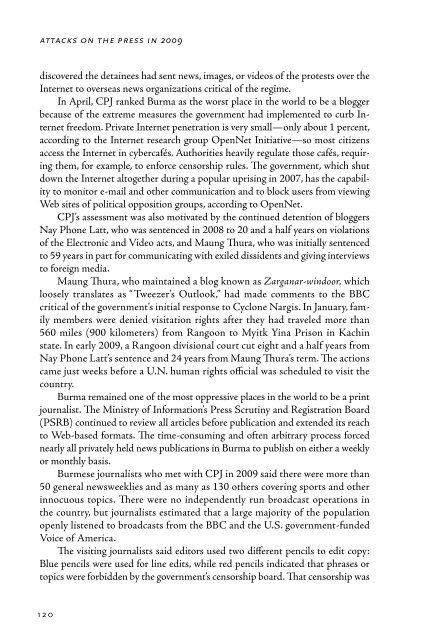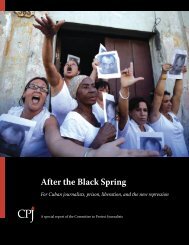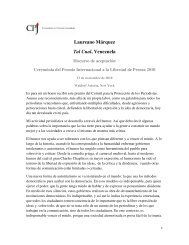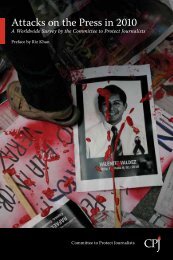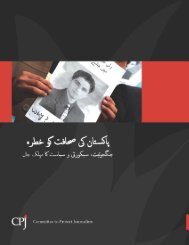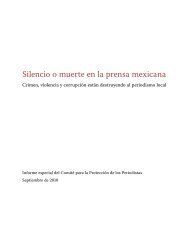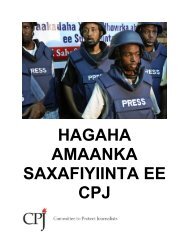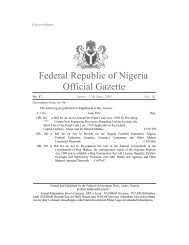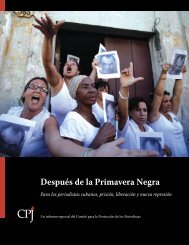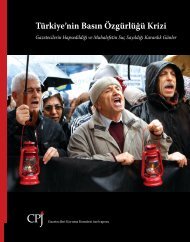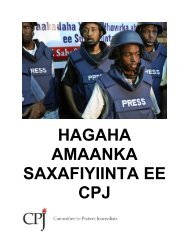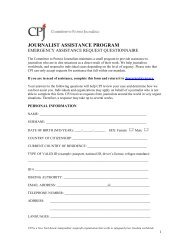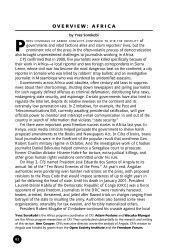Attacks on the Press - Committee to Protect Journalists
Attacks on the Press - Committee to Protect Journalists
Attacks on the Press - Committee to Protect Journalists
- No tags were found...
You also want an ePaper? Increase the reach of your titles
YUMPU automatically turns print PDFs into web optimized ePapers that Google loves.
attacks <strong>on</strong> <strong>the</strong> press in 2009asia: burmadiscovered <strong>the</strong> detainees had sent news, images, or videos of <strong>the</strong> protests over <strong>the</strong>Internet <strong>to</strong> overseas news organizati<strong>on</strong>s critical of <strong>the</strong> regime.In April, CPJ ranked Burma as <strong>the</strong> worst place in <strong>the</strong> world <strong>to</strong> be a bloggerbecause of <strong>the</strong> extreme measures <strong>the</strong> government had implemented <strong>to</strong> curb Internetfreedom. Private Internet penetrati<strong>on</strong> is very small—<strong>on</strong>ly about 1 percent,according <strong>to</strong> <strong>the</strong> Internet research group OpenNet Initiative—so most citizensaccess <strong>the</strong> Internet in cybercafés. Authorities heavily regulate those cafés, requiring<strong>the</strong>m, for example, <strong>to</strong> enforce censorship rules. The government, which shutdown <strong>the</strong> Internet al<strong>to</strong>ge<strong>the</strong>r during a popular uprising in 2007, has <strong>the</strong> capability<strong>to</strong> m<strong>on</strong>i<strong>to</strong>r e-mail and o<strong>the</strong>r communicati<strong>on</strong> and <strong>to</strong> block users from viewingWeb sites of political oppositi<strong>on</strong> groups, according <strong>to</strong> OpenNet.CPJ’s assessment was also motivated by <strong>the</strong> c<strong>on</strong>tinued detenti<strong>on</strong> of bloggersNay Ph<strong>on</strong>e Latt, who was sentenced in 2008 <strong>to</strong> 20 and a half years <strong>on</strong> violati<strong>on</strong>sof <strong>the</strong> Electr<strong>on</strong>ic and Video acts, and Maung Thura, who was initially sentenced<strong>to</strong> 59 years in part for communicating with exiled dissidents and giving interviews<strong>to</strong> foreign media.Maung Thura, who maintained a blog known as Zarganar-windoor, whichloosely translates as “Tweezer’s Outlook,” had made comments <strong>to</strong> <strong>the</strong> BBCcritical of <strong>the</strong> government’s initial resp<strong>on</strong>se <strong>to</strong> Cycl<strong>on</strong>e Nargis. In January, familymembers were denied visitati<strong>on</strong> rights after <strong>the</strong>y had traveled more than560 miles (900 kilometers) from Rango<strong>on</strong> <strong>to</strong> Myitk Yina Pris<strong>on</strong> in Kachinstate. In early 2009, a Rango<strong>on</strong> divisi<strong>on</strong>al court cut eight and a half years fromNay Ph<strong>on</strong>e Latt’s sentence and 24 years from Maung Thura’s term. The acti<strong>on</strong>scame just weeks before a U.N. human rights official was scheduled <strong>to</strong> visit <strong>the</strong>country.Burma remained <strong>on</strong>e of <strong>the</strong> most oppressive places in <strong>the</strong> world <strong>to</strong> be a printjournalist. The Ministry of Informati<strong>on</strong>’s <strong>Press</strong> Scrutiny and Registrati<strong>on</strong> Board(PSRB) c<strong>on</strong>tinued <strong>to</strong> review all articles before publicati<strong>on</strong> and extended its reach<strong>to</strong> Web-based formats. The time-c<strong>on</strong>suming and often arbitrary process forcednearly all privately held news publicati<strong>on</strong>s in Burma <strong>to</strong> publish <strong>on</strong> ei<strong>the</strong>r a weeklyor m<strong>on</strong>thly basis.Burmese journalists who met with CPJ in 2009 said <strong>the</strong>re were more than50 general newsweeklies and as many as 130 o<strong>the</strong>rs covering sports and o<strong>the</strong>rinnocuous <strong>to</strong>pics. There were no independently run broadcast operati<strong>on</strong>s in<strong>the</strong> country, but journalists estimated that a large majority of <strong>the</strong> populati<strong>on</strong>openly listened <strong>to</strong> broadcasts from <strong>the</strong> BBC and <strong>the</strong> U.S. government-fundedVoice of America.The visiting journalists said edi<strong>to</strong>rs used two different pencils <strong>to</strong> edit copy:Blue pencils were used for line edits, while red pencils indicated that phrases or<strong>to</strong>pics were forbidden by <strong>the</strong> government’s censorship board. That censorship wasstrictly enforced for news s<strong>to</strong>ries that referred <strong>to</strong> <strong>the</strong> first anniversary of Cycl<strong>on</strong>eNargis, which left 140,000 dead or missing and affected an estimated 2.4 milli<strong>on</strong>Burmese citizens, according <strong>to</strong> U.N. estimates. The exile-run Mizzima newsagency quoted Burmese edi<strong>to</strong>rs and journalists as saying that <strong>the</strong> PSRB had rejectedmaterials for publicati<strong>on</strong> that recounted <strong>the</strong> severity of <strong>the</strong> s<strong>to</strong>rm’s destructi<strong>on</strong>or showed victims still suffering from <strong>the</strong> s<strong>to</strong>rm’s impact.“We cannot be critical of <strong>the</strong> government’s efforts <strong>on</strong> recovery,” said <strong>the</strong>edi<strong>to</strong>r of <strong>on</strong>e weekly journal who was quoted in a Mizzima news report. “Ours<strong>to</strong>ries that say that victims are still suffering are rejected. We must publish<strong>on</strong>ly optimistic reports.” The state-run media simultaneously ran several newss<strong>to</strong>ries that portrayed positively <strong>the</strong> government-led rehabilitati<strong>on</strong> work in cycl<strong>on</strong>e-hitregi<strong>on</strong>s.On August 21, <strong>the</strong> PSRB formally banned and withdrew <strong>the</strong> publishinglicense for <strong>the</strong> weekly news journal Phoenix over violati<strong>on</strong>s of censorship rulesand regulati<strong>on</strong>s, according <strong>to</strong> a Mizzima report. Phoenix’s publisher, known asMaj. Mar-J, had earlier written satirical articles about <strong>the</strong> regime’s radical decisi<strong>on</strong><strong>to</strong> move <strong>the</strong> nati<strong>on</strong>al capital from Rango<strong>on</strong> <strong>to</strong> Naypyitaw, a newly builtand highly fortified center just outside <strong>the</strong> central <strong>to</strong>wn of Pyinmana.Foreign reporters were also targeted for harassment. On May 7, <strong>the</strong> governmentexpelled two U.S. journalists, Jerry Redfern and Karen Coates, who werein <strong>the</strong> country <strong>to</strong> teach a PSRB-approved course <strong>on</strong> feature writing and pho<strong>to</strong>graphy.They were arrested without explanati<strong>on</strong> in <strong>the</strong> central city of Mandalay,transported under guard <strong>on</strong> an overnight train <strong>to</strong> Rango<strong>on</strong>, and deported withoutcharge <strong>to</strong> Thailand. “They asked us nothing, <strong>to</strong>ld us nothing, searched nothing,<strong>to</strong>ok nothing,” <strong>the</strong> two said in a prepared statement released after landing inBangkok.The regime also threatened those who published critical articles in prominentforeign news publicati<strong>on</strong>s. On September 9, U Win Tin, former journalist andcurrent Nati<strong>on</strong>al League for Democracy co-leader, wrote an op-ed in The Washingt<strong>on</strong>Post titled “An Electi<strong>on</strong> <strong>the</strong> Burmese People D<strong>on</strong>’t Need,” which openlycriticized <strong>the</strong> military government’s plan <strong>to</strong> hold voting before achieving nati<strong>on</strong>alrec<strong>on</strong>ciliati<strong>on</strong> with <strong>the</strong> political oppositi<strong>on</strong> and while detaining more than 2,000political pris<strong>on</strong>ers.U Win Tin was detained and interrogated <strong>on</strong> September 12 but releasedwithout charge <strong>the</strong> same day. A former edi<strong>to</strong>r-in-chief of <strong>the</strong> Hanthawati dailynewspaper, he served 19 years of a 20-year pris<strong>on</strong> sentence <strong>on</strong> various charges,including inciting treas<strong>on</strong> against <strong>the</strong> state for writing and distributing pamphletsduring antigovernment uprisings in 1988 that were crushed by <strong>the</strong> military. Hewas released in November 2008 after suffering two heart attacks in pris<strong>on</strong>. Internati<strong>on</strong>aladvocacy groups campaigned for years for his release.120121


